A lesson from an EA weekend in London: pairing people up to talk 1 on 1 for 30 mins seems to be very useful
By saulius @ 2018-06-12T11:38 (+16)
We organised an EA weekend in London for people who are already familiar with EA. A review of CZEA "Intense EA Weekend" retreat was helpful to us so I am sharing the lessons we learned as well.
Table of contents
Main lesson: 1 on 1s seem to be very useful
Event descriptions and lessons from running them
Productive disagreements workshop
Discussing various topics in small groups
"How to talk about EA" workshop
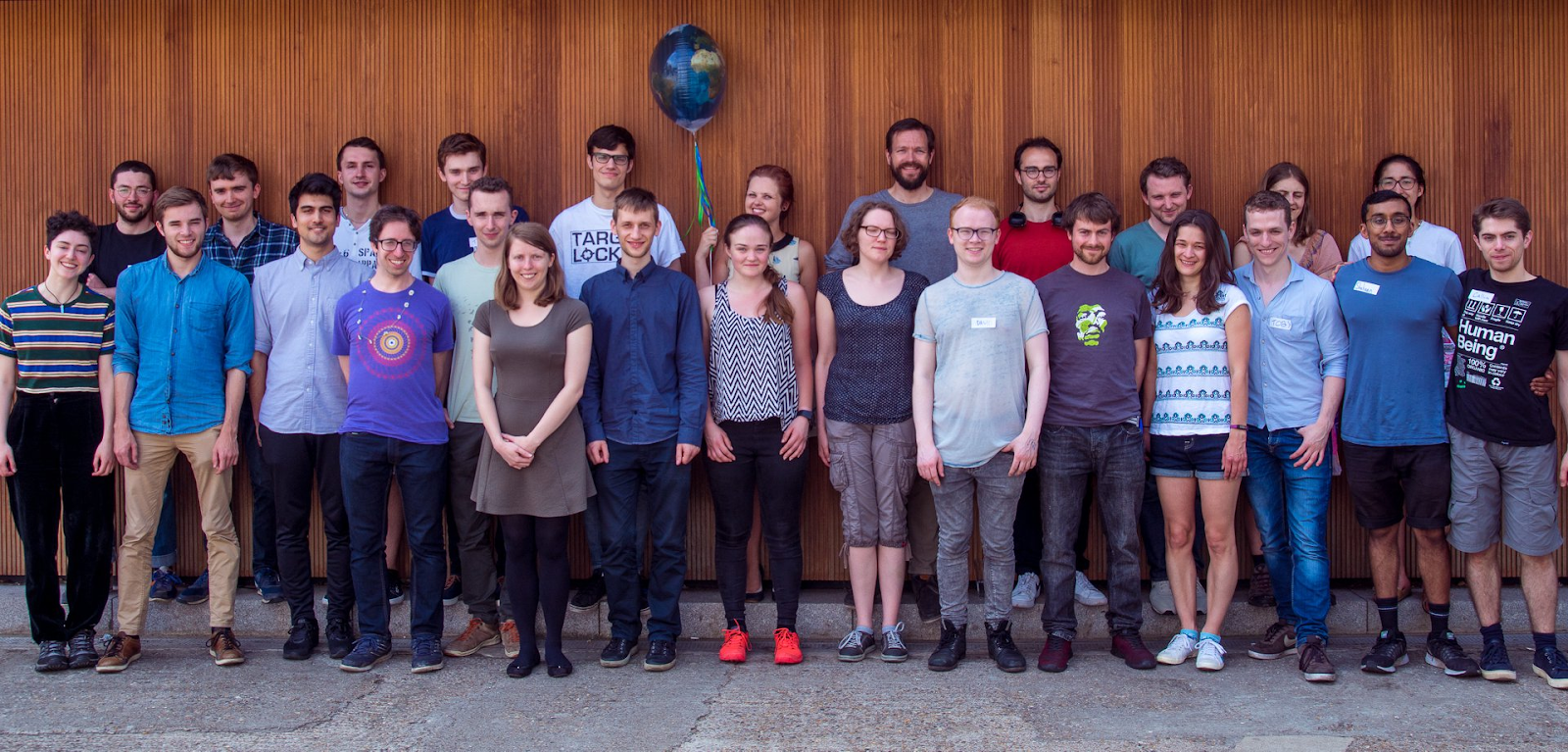
Main lesson: 1 on 1s seem to be very useful
We experimented with various event formats. In a feedback form we asked to rate how useful each event was (for having a greater positive impact) on a scale of 1 to 10. According to the feedback, the most valuable event was pairing people up to talk 1 on 1 for 30 minutes:
|
Activity |
Weighted and normalised* |
Unweighted |
Vote count |
|
1-1s |
7.3 |
6.8 |
24 |
|
Career Club |
6.6 |
5.9 |
16 |
|
Murphyjitsu (next steps): how useful? |
6.3 |
5.4 |
17 |
|
Hamming Circles |
6.2 |
5.6 |
20 |
|
Socialising after the events |
6.1 |
5.6 |
21 |
|
Decision Making workshop |
6 |
5.3 |
14 |
|
“How to talk about EA” workshop |
5.5 |
4.8 |
17 |
|
Lightning talks |
5.4 |
4.9 |
20 |
|
Productivity workshop |
5.4 |
4.6 |
8 |
|
Productive disagreements workshop |
5.3 |
4.8 |
19 |
|
1 minute introductions |
5.1 |
4.6 |
19 |
|
Discussion about where to donate |
5 |
4.7 |
7 |
|
Explaining Concepts |
5 |
4.7 |
20 |
|
Discussion about diversity within EA |
4.4 |
4.2 |
10 |
*see this comment for explanation
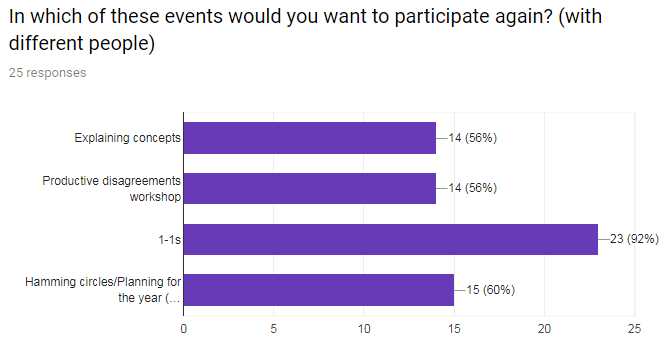
This is consistent with feedback from group leaders' retreat where 1 on 1s were voted to be the most valuable activity on most days. What is more, when asked what the most enjoyable part of the weekend was, six respondents answered that it was 1 on 1s (the most common answer).
We gave each of the participants a piece of paper with a list of questions to ask each other to jump-start the conversations. I think we told them that asking the questions was optional. The questions may have helped to avoid the fear of running out of topics to talk about, even if they weren't used directly. We tried to pair people who don’t know each other well and have something in common.
The rest of this post does not contain anything important but could be useful to people who are organising similar events.
Overall feedback
30 people attended on at least one of the days (excluding 4 organisers). 25 attendees filled the feedback form. One of the questions was:
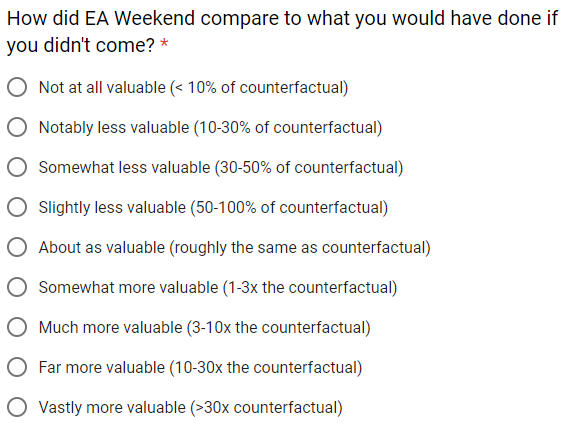
Here are the results:
|
Answer |
Count |
|
About as valuable (roughly the same as counterfactual) |
1 |
|
Somewhat more valuable (1-3x the counterfactual) |
8 |
|
Much more valuable (3-10x the counterfactual) |
9 |
|
Far more valuable (10-30x the counterfactual) |
5 |
|
Vastly more valuable (>30x counterfactual) |
2 |
It’s unclear how good people are at answering such a difficult question but overall, the event seems to have been successful.
You can see a full summary of responses to the feedback form here. It includes answers to some free text questions that are not discussed in this post.
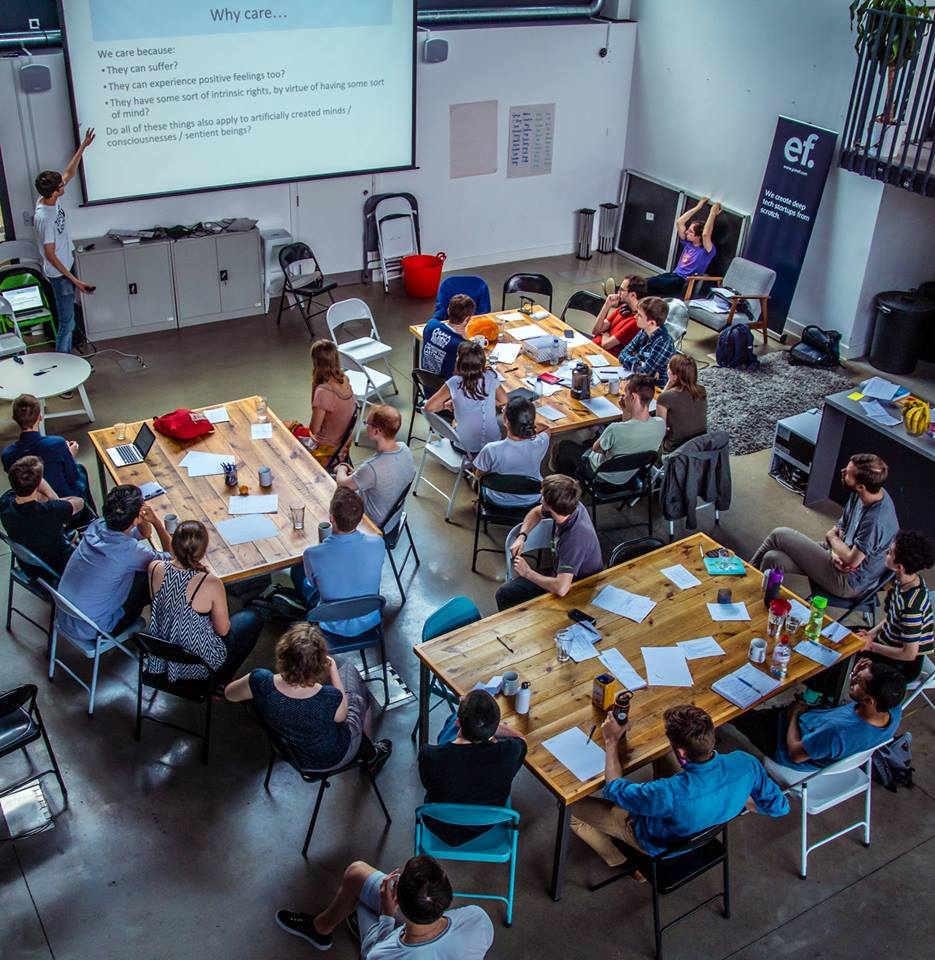
Schedule
Saturday
9:30 - 10:30 Arrivals & registration
10:30 - 10:45 Overview & schedule
10:45 - 11:45 One-minute introductions
11:50 - 13:00 Explaining concepts
13:00 - 14:00 Lunch
14:00 - 15:30 Productive disagreements workshop
15:40 - 16:40 Decision-making workshop or circling in a park
16:50 - 18:00 1-1s
18:00 - 23:00 Socialising, dinner
Sunday
9:30- 10:25 Arrivals
10:25 - 11:00 Group loving-kindness meditation or discussion in another room
11:00 - 11:15 Intro to the day
11:15 - 12:20 Hamming circles/Planning for the year
12:25 - 13:00 1-1
13:00 - 14:00 Lunch
14:00 - 14:30 1-1
14:30 - 14:40 Group photo
14:40 - 15:40 Career club or discussion about where to donate in another room
15:50 - 16:15 Lightning talks (Moral Circle Expansion and a short talk about tax-efficiency)
16:15 - 16:50 Discussing various topics in small groups
16:50 - 17:25 "How to talk about EA" workshop
17:30 - 18:15 Problem-solving circle: next steps
18:15 - 18:30 Feedback
18:30 - 22:00 Socialising, laughter yoga
Slides from the event can be seen here.
Event descriptions and lessons from running them
One-minute introductions
Everyone had 1 minute to introduce themselves. The purpose was for people who have something to talk about to know about each other. The following slide was shown to give people ideas on what to talk about:
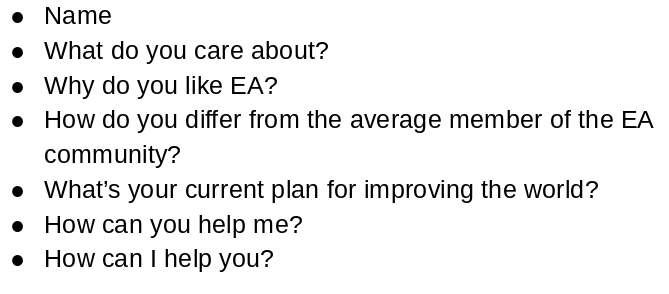
Questions were ordered and picked in a way to make it less intimidating to talk. However, it caused many of the answers to be less informative. It would’ve probably been better to put questions like “What’s your plan for improving the world?” first. It was also difficult to hear what many people said partly due to bad acoustics. Two people wrote that they were uncomfortable introducing themselves. Overall, some online document or a sheet on the wall would have probably been better.
Explaining concepts
This is an idea we took from CZEA "Intense EA Weekend" retreat because this was rated as the most useful event at that retreat. The participants were asked to pick from a list of interesting concepts (e.g. scope insensitivity, optimiser’s curse) which ones they would like to have explained to them or explain to others. We used a different sheet from CZEA. Our sheet can be seen here. We asked people to divide into pairs or small groups and find different people when they hear a gong (every 15 minutes). We told that it is ok to skip topics if they don’t want to explain them or have them explain. According to the feedback, this was not a successful event.
Productive disagreements workshop
This idea was taken from an event that was ran in New York and adapted for EA purposes. First, I gave a short talk on how to disagree productively. I then asked everyone to rate whether they "agree", "disagree" or are "unsure" on various controversial EA topics and give their opinions on the importance of various causes. A sheet of questions can be seen here (note that there are two tabs). We then asked participants to pair up, compare sheets, find disagreements and discuss. Every 15 minutes we asked everyone to find a different pair.
One piece of feedback about the event was: “Hard to find disagreement. Many statements were too hard to have a confident belief on.” I think another issue was that many people didn’t know enough about some of the topics to have meaningful discussions.
One idea was that explaining concepts and productive disagreements workshops could help people to have more productive discussions during 1 on 1s because it sets a tone of talking about EA topics. What is more, people could continue one of these activities during the 1 on 1s. Some people told me that events were successful in this regard. However, it still seems like overall they weren’t very successful.
Discussing various topics in small groups
The idea was:
- People suggest many topics
- I read the list of topics and everyone votes on the ones they want to discuss (multiple votes allowed)
- People separate into groups based on which topic they want to discuss the most.
This is the way discussions are organised at a philosophy meetup I occasionally attend. One mistake I made is not giving people a minute to think of topics to discuss. The only topics suggested were
- Diversity within EA community
- Value drift
- Productivity and self-improvement (this wasn’t really a topic, it had prepared materials)
We separated into three groups to discuss these. Discussions did not work too well, possibly because the groups were too big.
"How to talk about EA" workshop
We separated into 4 groups based on which subtopic we wanted to discuss. Subtopics were:
- How to talk about EA with people interested in you
- How to talk about EA with people interested in the ideas
- How to talk about EA with people you want to be interested in the ideas
- How to talk about EA with people already on board
In the feedback form, two people mentioned that they’d rather this was a workshop (possibly a one that includes roleplay) rather than a discussion.
Application forms
We publicly advertised an expression of interest google form. Purposes were:
- See how many people are interested
- Filter out the people who are not yet familiar with EA (because the event was not aimed at newcomers). This required quite a lot of effort. I don't think it was worth it.
- See which events people are most interested in attending
Out of 57 people who filled the form, only 14 attended the event. This is partly because we publicized the form 2 months before the event but sent tickets only 2 weeks before the event because that’s when the availability of the venue was confirmed. Some people made other plans for the weekend because they weren’t sure if the event is going to happen. We had to send the tickets sooner with no venue specified. Many of the attendees came because we invited them personally 2 weeks before the weekend. Some of them also invited other people. There could have been many more attendees if we sent invitations sooner. However, it’s unclear whether it would’ve been easy to manage many more people.
undefined @ 2018-06-12T13:43 (+4)
Thanks for writing this up. Three questions
The numbers on how useful things are seem quite low to me. What did you write as the ends of the scale? I'm thinking in terms of net promoter scores where anything below a 9 or a 10 is considered neutral or bad.
Can you explain Hamming circles? I couldn't find out how they worked even after a quick google.
Did you ask people if there was anything they wanted to do on the weekend but didn't do? I'd be curious to see if people came up with anything.
undefined @ 2018-06-12T15:32 (+2)
3) Because of your question I added a link to the summary of the responses to the feedback form to the article. Here are responses I see that suggest different activities:
- Perhaps a little more discussion about actual causes e.g. what should be done about AI
- In addition to the 1-1s(which were really useful), the could have been some more structured socialising (eg having people come together in groups of 3 and talk about what they care about, what their problems are, etc and switch groups in eg 5 minute intervals)
- Maybe one minute intros could be on a post it on a wall so that people coming a day late still know who does what.
We also had some event ideas ourselves that we decided not to include in the weekend:
- Community health session (a discussion of ways to improve the health of the EA community, be that through more diversity, more mutual support etc.)
- Self-care for the altruistic (discussion and support session)
- Discussions/anti-debate on cause prioritisation
- Watching a video of a talk together and then discussing it (vote on a talk to watch during the event)
- Values session: discussing why we have certain moral values
- Problem-solving circle (participants raise problems they have and others try to help them)
- The Humane League Work Party (Encouraging companies to commit to improving conditions on farms - writing letters & emails, phone calls, petitions. Would have been an option throughout the event.)
- Gathering and interpreting data relating to the impact of charities for SoGive
undefined @ 2018-06-12T14:44 (+2)
2) I will ask the person who ran Hamming circles to explain it, I only participated in half of the event myself. You can get some idea from the slides (slides 21- 28).
undefined @ 2018-06-12T14:14 (+2)
1) >"The numbers on how useful things are seem quite low to me..."
On the scale 1 was "Useless" and 10 was "Life-transforming". But just before asking for feedback, I made a change in the slides and added this meaning to the ratings of the events:
"3 - £100, 5 - £1,000, 8 - £10,000, 10 - £100,000 (e. g. career change)"
I explained it to people as well. This was... not smart. Because of this, some respondents gave low scores to all the events. E.g. someone said that the weekend was "Far more valuable (10-30x the counterfactual)" but did not gave any event a rating that is higher than 4. Others ignored the point and gave high ratings for all events.
That's why I weighted and normalised the ratings. If someone said that the weekend was "Vastly more valuable (>30x counterfactual)", I multiplied all their ratings by a constant so that their highest rating would be 10. If they rated the weekend as "Far more valuable (10-30x the counterfactual)", I multiplied all their ratings so that the highest rating would be 9. 8 for "Much more valuable", 7 for "Somewhat more valuable", and 6 for "About as valuable".
undefined @ 2018-06-19T20:15 (+1)
I guess this very much depends on how individual activities are executed. We had our 2.5 day retreat in Dortmund, Germany about a month ago, and while I didn't see the evaluation results, I got a strong impression that most people agreed on these points (still, take this with a grain of salt):
career discussion in small groups (~3-5) was quite useful; we had about 1 hour per group, and more would probably have been better.
double crux (I guess similar to productive disagreement?) was a cool concept, but a bit difficult to execute under the given circumstances (although it worked great for me), for similar reasons as mentioned by you
discussion about where to donate - this was, to some degree, what this weekend was primarily about for us, as we raised money on the first evening and then had to figure out where to send it. And while it started very slowly, we ended up spending many hours on Sunday on this (very open) discussion, and it was tremendously valuable. I really didn't expect this, but ultimately, judging from how engaged everybody was, how interesting our conversations were in the end, and how often each of us changed their mind over the course of the discussion, this was a great way to spend our time
undefined @ 2018-06-13T07:58 (+1)
Hi Saulius. CZEA retreat organizer here.
Thank you for this report.
We did "concept explaining somewhat differently:
- a) people could fill out form w/ list of concepts they can/want explain several days earlier. They also had links to recommended articles for many of concepts offered.
- b) during activity we projected on a screen list of groups (~3 people learning, one teaching) and what is their concept for this session.
- c) after 15 minutes we hit the gong and projected list of new groups with new topics.
It seems to me that Circling and Hamming circles need the people to feel close and trusting each other. We thought about doing Hamming circles on Saturday evening but decided to do something else because the atmosphere was not right. How well it worked for you?
undefined @ 2018-06-13T18:11 (+1)
I didn't attend, but someone told me the circling thing was awkward.
undefined @ 2018-06-13T12:31 (+1)
I see, that is very different.
I only know about the feedback I already presented and the one hamming circle I myself participated in. In my circle all 3 of us were quite connected already. It may have helped but I'm not sure it was necessary. Both of them didn't know what to do with their careers so it was like a mini career-coaching session. It felt productive.